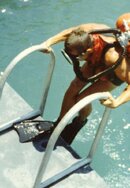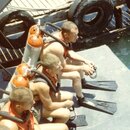That was a very interesting discussion we had today. On the way home, I was thinking about the skill level of divers today, as there was definite concern. I came to one realization, and that was that with on-line training, we are keeping student divers from an activity which is essential to diving, psycho-motor skills. On-line training works only on mental training; knowing concepts, understanding things like the universal gas laws (Charles' Law, for instance). But it does nothing to help a student diver's ability to apply those concepts in the water.
Psychomotor learning
"Psychomotor learning is the relationship between cognitive functions and physical movement. Psychomotor learning is demonstrated by physical skills such as movement, coordination, manipulation, dexterity, grace, strength, speed—actions which demonstrate the fine or gross motor skills, such as use of precision instruments or tools, and walking.
"Behavioral examples include driving a car, throwing a ball, and playing a musical instrument. In psychomotor learning research, attention is given to the learning of coordinated activity involving the arms, hands, fingers, and feet, while verbal processes are not emphasized.[1]..."
Stages of psychomotor development
According to Paul Fitts and Michael Posner's three-stage model, when learning psychomotor skills, individuals progress through the cognitive stages, the associative stage, and the autonomic stage.[2] The cognitive stage is marked by awkward slow and choppy movements that the learner tries to control. The learner has to think about each movement before attempting it. In the associative stage, the learner spends less time thinking about every detail, however, the movements are still not a permanent part of the brain. In the autonomic stage, the learner can refine the skill through practice, but no longer needs to think about the movement.[3]
In the U.S. Naval School for Underwater Swimmers, we were given one task to fulfill which was required, and it demonstrated these psycho-motor skills. We had to dive into the bay at Key West to the bottom with a canvas bag, and inside were parts of a structure. We had to, as a buddy team in zero visibility, put together this tool underwater, and bring it back up in the bag fully assembled. If we did not do this, we would have "failed" and would have had to start the Underwater Swimmers School over again.
What does this demonstrate. First, that we could dive in zero visibility and, by feel with our buddy, take parts out, not lose them into the mud on the bottom, and figure out what part it was, and what part it went into. It was made of PVC pipe, and it had a peculiar configuration which we were shown before the dive. So we needed to be comfortable enough in our twin 90 scuba and in zero visibility to do the work. This demonstrates that the diver is comfortable in the water, in his/her gear, and can think about the assignment without undue concerns for personal wellbeing.
NAUI used to, in their 1975 Blue Book, have a complete section on "The Psychology of Learning." They defined learning as "
a change in behavior as a result of experience." A bit further on, it states, "...learning physical skills involves more than muscles...It should have become obvious that, while a muscular sequence was being learned, other things were happening as well. The perception changed as the sequence became easier. Concepts of how to perform the skill were developed and attitudes were changed..."
It went on to show a graph, and stated, "...Most graphs of the progress of skill learning usually follow the same pattern. There is rapid improvement in the early trials. But the curve levels off and may stay level for significant periods of effort. Further improvement may seem unlikely. Such a development is a learning plateau and may signify any number of conditions. The learner may have reached the limits of his capability; he may be consolidating his level of skill; his interest may have waned; or he may need a more efficient method of increasing his progress. Keep in mind that the apparent lack of increasing proficiency does not necessarily mean that learning has ceased. The point is that, in learning motor skills, a leveling off process is normal and should be expected after an initial period of rapid improvement. Tthe instructor should prepare the student for this situation to ward off discouragement. If the student knows this may occur his frustration may be lessened..."
The NAUI Blue Book went on to discuss "The 'Laws' of Learning." This included the "Law of readiness, the "Law of exercise," the "Law of Effect," the "Law of primacy," the "Law of intensity," and the "Law of recency."
This is a very good section of the NAUI Blue Book that I have used for years in designing my safety training programs. This whole set of concepts about learning has been thrown out with the development of the E-Learning programs. I think this is an area where we can influence the diving industry to get back to the basics of dive training, and start graduating divers who are truly ready for the underwater environment.
John



 while the thread go nuts over this one!
while the thread go nuts over this one!

